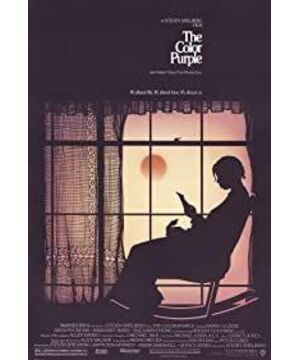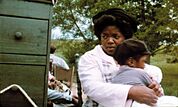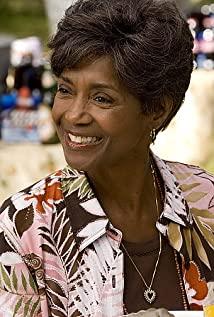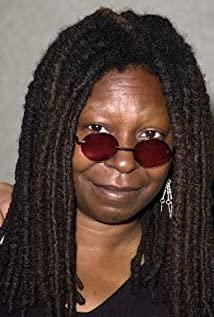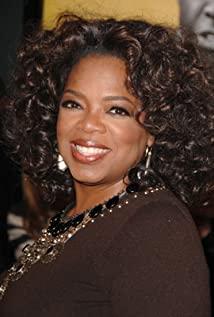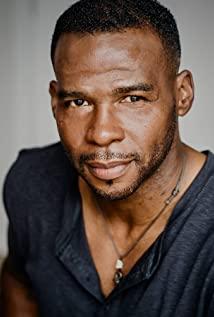Women's vision of a beautiful future should not and will not be stifled. You are not just bad children, you are bad seeds. Flowers, as important props in this film, run through the whole film. The beginning is a purple flower bush. The sexual implication represented by the flower shape like female reproductive organs declares the female theme of this film. Even if there is beauty in Sealy's personality, But the protagonist at this time can only make men feel the neutral part of a woman's identity. They judge her by her ugliness, as a public tool for her stepfather's birth and a plaything for her husband to vent their desires, but they ignore the beautiful part of women. In many places after that, such as in the joyful atmosphere of the church, we gave a close-up view of Celie. She was holding a small bouquet of this kind of flowers, and her expression was confused, but the same kind of flowers here are no longer just focused on expressing sexual intercourse. , is also a kind of creature that symbolizes beauty, which is also the embodiment of Celie's personality and spiritual changes, reminding people that Celie has gradually set off on the beautiful road of freedom and struggle while she is confused. By the end of the film, the sexuality of the flower is lessened, and the beauty of the perceived femininity is accentuated. The film "Purple" is a distinctly feminist film, and in this accident, the director may still intentionally express something different from feminism. The director has a particularly obvious attitude in the shaping of the characters. He divides the characters in the film, and even all the women the director hopes to represent by the women in the film, into two different groups in the first half of the film, similar to the Two opposing factions, one represented by Celie, agree with the so-called rules: It’s not wrong for a husband to beat a woman, it’s hard for black people to own a car, a house, etc. These deformed Chen Gui erected a deformed moral wall in their hearts. Even if they felt pain, they didn’t dare to show dissatisfaction and protest. Celie often watches the children outside the door from the windows and doors. The innocent child symbolizes hope. The husband gets the letter but doesn't give it to her, photographing her pain from the window, etc. Wipe the thick layer of the wall when cleaning Ash, she saw the flowers under the ashes. Could it not be herself? Ash and the doors and windows are the deformed wall. They yearn for happiness, but they are often imprisoned in another world, a world different from free people. The other party represented by Xiuge, including Sophia, sister Neti, etc., is a symbol of breaking stereotypes, fighting and striving for independence and freedom. The word "resistance" was first proposed by Neti, and then Sophia mentioned it again. It is enough to reflect most of their resistance, and Xiuge is a person who fights from beginning to end. There is almost no inferiority and humiliation in her personality. But there is a process of transformation between these two people, that is, Celie and Sophia. While Celie was suffering, Neti taught her English, which symbolized hope. Even after Johnson's attempted rape of Neti, her book fell into the quagmire, but it only faltered and didn't change her. Essentially, because there are important props in the following text: Letters and mailboxes, this is also hope. This is Neti's change to Celie, the faint hope in Celie's dark life, but she has never stopped. And Sophia confronted Johnson the first time she came to her house, and the conversation with Celie about the "resistance" in the field was another change to Celie. Unlike Netty, she was in action. Wake up Celie directly. She divorced and remarried, and Celie began to realize the struggle. And her real change is because of Xiu Ge - a perpetual radical, she composes songs for Celie, chooses clothes, kisses her, these series of actions are all great affirmations for Celie, and Celie finally With self-confidence, even if she hasn't arrived at the dinner table for a scene, it can be seen from the comparison of her two shaves, the overturning of the suit rack behind her, and the slamming of doors, that she has completely established an independent and free personality. Sophia went against her. The disrespect of Johnson, Harpo, and even Celie did not cause substantial damage to her, and she still adhered to the spirit of resistance. But when she broke away from the two factions, that is, the scene of fighting the mayor on the street, the struggle she was proud of was worthless. She realized that what was more terrible than being a woman was being a black person. After she was released from prison He became a servant for Miss Milley, and what the director wanted to express through her was not just a female issue. The white people represented by Milley, including the white people who held Celie's daughter before, may have sympathy for people of color, but they can still see the discrimination against people of color in their hearts through their demeanor and performance. And in the end, Celie rescued her, just as she had rescued Celie in the first place. The director's attitude towards characterization leads to the spirit of resistance he expects to see, perhaps based on gender but not limited to gender, but also a spirit of resistance to changes made by treating injustice and discrimination, and in this film, it It is done by some women who are more rare and difficult in reason. In this film, there is a religious atmosphere that cannot be ignored, and the church that appears frequently is the best proof. Among them is a character, Xiuge's father, who has very little role, but is the only weakness of Xiuge, a near-perfect woman. He is a church minister, and it seems that Xiuge's mission is to save Celie. After the first appearance, Xi Li did not get out of the bitter sea, so he did not forgive Xiuge at this time, and at the end of the film, the director of the drama he met with Xiuge used an extraordinarily artistic method, Xiuge Singing hymns with the church, the light-colored atmosphere is also extraordinarily sacred, and her father's forgiveness seems to be a compliment to her for completing the task. As for the other characters, Neti is more deeply religious in Africa. She is the sustenance of Celie, that is, her god. In the scene where Celie was at the dinner table, Sophia was almost an epiphany, while Harbo was The girl on the side also offered to leave, and Celie finally became their god, as well as her own. The core thematic part of this film, that is, the feminist part, naturally cannot be ignored. Equality between men and women is the norm that everyone should abide by. Just like in the climax of the dinner table, Sealy's line: "You are bad children." Children symbolize inheritance and hope, but women are inferior when they have been accepted for a long time. values, they have become evil seeds and will only bring endless despair. At the same time, the director proposed the theme of struggle. He seems to want people to understand that equality is not just a matter of thinking. Just like Eileen Chang's point of view: not having women's rights is the fault of women themselves. Emphasizes that women should fight, and while fighting, they should also have an independent personality. Just like the trousers store in the film, Celie can avoid being like Johnson's prophecy at the dinner table. Such values are extremely important today. Women are willing to fight for rights and interests, but if they are not confident and independent, they need the other party to have a house and a car to get married, and rely on their parents and friends at home to "snatch" the rights and interests, what's the point? ?
View more about The Color Purple reviews


